| Saudi Arabia at the 2019 World Aquatics Championships | |
|---|---|
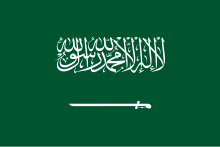 | |
| FINA code | KSA |
| World Aquatics Championships appearances | |
Saudi Arabia competed at the 2019 World Aquatics Championships in Gwangju, South Korea from 12 to 28 July.
| Saudi Arabia at the 2019 World Aquatics Championships | |
|---|---|
 | |
| FINA code | KSA |
| World Aquatics Championships appearances | |
Saudi Arabia competed at the 2019 World Aquatics Championships in Gwangju, South Korea from 12 to 28 July.
Saudi Arabia entered one swimmer. [1]
| Athlete | Event | Heat | Semifinal | Final | |||
|---|---|---|---|---|---|---|---|
| Time | Rank | Time | Rank | Time | Rank | ||
| Yousif Bu Arish | 50 m butterfly | 25.48 | 64 | Did not advance | |||
| 100 m butterfly | 56.58 | 58 | Did not advance | ||||

The economy of Saudi Arabia is the largest one in the Arab States and eighteenth largest in the world. A permanent and founding member of the OPEC, Saudi Arabia is also a member of the G20 forum as one of the world's largest economies. The country's economy relies heavily on the patronage and services supported by the national government.

Riyadh, formerly known as Hajr al-Yamamah, is the capital of Saudi Arabia. It is the largest and most populous city of the country. It is also the capital of the Riyadh Province and the centre of the Riyadh Governorate.

Saudi Aramco, officially the Saudi Arabian Oil Company, is a Saudi Arabian public petroleum and natural gas company based in Dhahran. As of 2020, it is one of the largest companies in the world by revenue. Saudi Aramco has both the world's second-largest proven crude oil reserves, at more than 270 billion barrels, and largest daily oil production of all oil-producing companies. It is the single greatest contributor to global carbon emissions of any company in the world since 1965. On 11 May 2022, Saudi Aramco became the largest company in the world by market cap, surpassing Apple Inc.

Saudi Arabia, officially the Kingdom of Saudi Arabia (KSA), is a country on the Arabian Peninsula in Western Asia. It has a land area of about 2,150,000 km2 (830,000 sq mi), making it the fifth-largest country in Asia, the second-largest in the Arab world, and the largest in Western Asia. It is bordered by the Red Sea to the west; Jordan, Iraq, and Kuwait to the north; the Persian Gulf, Qatar and the United Arab Emirates to the east; Oman to the southeast; and Yemen to the south. Bahrain is an island country off the east coast. The Gulf of Aqaba in the northwest separates Saudi Arabia from Egypt. Saudi Arabia is the only country with a coastline along both the Red Sea and the Persian Gulf, and most of its terrain consists of arid desert, lowland, steppe, and mountains. Its capital and largest city is Riyadh. The country is home to Mecca and Medina, the two holiest cities in Islam.
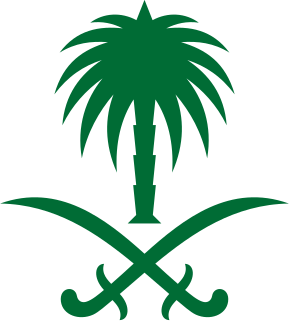
Human rights in Saudi Arabia are a topic of concern and controversy. The Saudi government, which mandates both Muslim and non-Muslim observance of Islamic law under the absolute rule of the House of Saud, has been accused of and denounced by various international organizations and governments for violating human rights within the country. The authoritarian regime ruling the Kingdom of Saudi Arabia is consistently ranked among the "worst of the worst" in Freedom House's annual survey of political and civil rights. On 28 December 2020, the Criminal Court in Riyadh sentenced a prominent Saudi women's rights activist to nearly 2 years in prison, drawing renewed attention to the kingdom's human rights abuses.

The Saudi Arabia national football team represents Saudi Arabia in men's international football, and the team's colours are green and white. Saudi Arabia are known as Al-Suqour and Al-Akhdhar ; the team represents both FIFA and Asian Football Confederation (AFC).

Salman bin Abdulaziz Al Saud is King of Saudi Arabia, reigning since 23 January 2015. Prior to his accession, he was Crown Prince of Saudi Arabia from 16 June 2012 to 23 January 2015. He is the 25th son of King Abdulaziz and the sixth of his sons who have reigned as kings.

The Saudi Arabian Football Federation is the football governing body of Saudi Arabia. Founded in 1956, its responsibilities include administration of club competitions and national teams. The founder of the Saudi Arabian Football Federation is Prince Abdullah bin Faisal Al-Saud

Al-Wehda FC is a multi-sports club from Mecca, Saudi Arabia, founded in 1916, making it the third oldest club in Saudi Arabia. The football section plays in the Saudi Professional League. They also have a handball section.
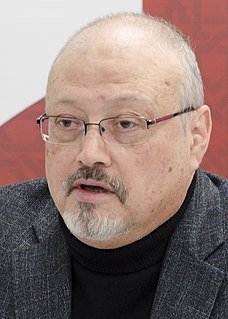
Jamal Ahmad Khashoggi was a Saudi Arabian journalist, dissident, author, columnist for Middle East Eye and The Washington Post, and a general manager and editor-in-chief of Al-Arab News Channel who was assassinated at the Saudi consulate in Istanbul on 2 October 2018 by agents of the Saudi government, allegedly at the behest of Crown Prince Mohammed bin Salman. He also served as editor for the Saudi Arabian newspaper Al Watan, turning it into a platform for Saudi progressives. Khashoggi fled Saudi Arabia in September 2017 and went into self-imposed exile. He said that the Saudi government had "banned him from Twitter", and he later wrote newspaper articles critical of the Saudi government. Khashoggi had been sharply critical of the Saudi rulers, King Salman and Crown Prince Mohammed bin Salman. He also opposed the Saudi Arabian-led intervention in Yemen.

Bilateral relations between Saudi Arabia and the United States began in 1933 when full diplomatic relations were established and became formalized in the 1951 Mutual Defense Assistance Agreement. Despite the differences between the two countries—an Islamic absolute monarchy, and a secular constitutional republic—the two countries have been allies ever since. The core logic underpinning the relationship is that the United States provides military protection of Saudi Arabia in exchange for a reliable oil supply from the Saudis, pricing of oil in US dollars, and Saudi support for US foreign policy operations across the world. However, the Saudi Ambassador to the US, Reema bint Bandar says the relationship in recent years has shifted from “oil for security” to one that is built around regional growth, food and energy security, stability, and climate change. The current status of the alliance was given 15 July 2022 in The Jeddah Communique: A Joint Statement Between the United States of America and the Kingdom of Saudi Arabia that was attended by President Joe Biden in Jeddah.
Capital punishment is a legal penalty in Saudi Arabia. Death sentences are almost exclusively based on the system of judicial sentencing discretion (tazir), following the classical principle of avoiding Sharia-prescribed (hudud) penalties when possible. In recent decades, the government and the courts have increasingly issued these sentences, reacting to a rise in violent crime during the 1970s. This paralleled similar developments in the U.S. and Mainland China in the late 20th century.
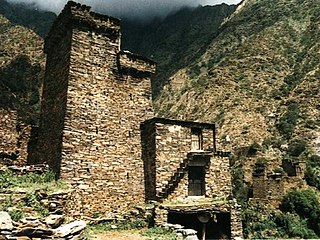
Saudi Arabia is the second biggest tourist destination in the Middle East with over 16 million visiting in 2017. Although most tourism in Saudi Arabia still largely involves religious pilgrimages, there is growth in the leisure tourism sector. As the tourism sector has been largely boosted lately, the sector is expected to be the white oil for Saudi Arabia. This is proved as tourism sector is expected to generate $25 billion in 2019. Potential tourist areas include the Hijaz and Sarawat Mountains, Red Sea diving and a number of ancient ruins.

Women's societal roles in Saudi Arabia are heavily impacted by Islamic and local traditions of the Arabian Peninsula. Saudi women have experienced major rights reforms since 2017, after facing religious fundamentalist dominance dating from 1979.

The Hajj is an annual Islamic pilgrimage to Mecca, Saudi Arabia, the holiest city for Muslims. Hajj is a mandatory religious duty for Muslims that must be carried out at least once in their lifetime by all adult Muslims who are physically and financially capable of undertaking the journey, and of supporting their family during their absence from home.

The king of Saudi Arabia is the monarchial head of state and head of government of Saudi Arabia who holds absolute power. He is the head of the Saudi Arabian royal family, the House of Saud. The king is called the "Custodian of the Two Holy Mosques", a title that signifies Saudi Arabia's jurisdiction over the mosques of Masjid al Haram in Mecca and Al-Masjid an-Nabawi in Medina. The title has been used many times through the history of Islam. The first Saudi monarch to use the title was King Faisal, however, King Khalid did not use the title after him. In 1986, King Fahd replaced "His Majesty" with the title of Custodian of the Two Holy Mosques, and it has been ever since used by both King Abdullah and King Salman bin Abdulaziz.
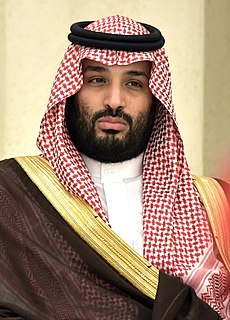
Mohammed bin Salman Al Saud, colloquially known as MBS, is a Saudi Arabian politician who is the crown prince, deputy prime minister, and minister of defense of Saudi Arabia. He also serves as the chairman of the Council of Economic and Development Affairs and chairman of the Council of Political and Security Affairs. He is the seventh son of King Salman bin Abdulaziz and the eldest of six sons born to King Salman's third wife, Fahda bint Falah Al Hithlain. Mohammed bin Salman controls his father's government and is considered the de facto ruler of Saudi Arabia. In June 2017, King Salman removed his nephew Muhammad bin Nayef from the position of crown prince and appointed Mohammed bin Salman in his place.

On 26 March 2015, Saudi Arabia, leading a coalition of nine countries from West Asia and North Africa, launched an intervention in the Yemeni Civil War in response to calls from the president of Yemen Abdrabbuh Mansur Hadi for military support after he was ousted by the Houthi movement.

The Iran–Saudi Arabia proxy conflict, sometimes also referred to as the Middle Eastern Cold War, is the ongoing struggle for influence in the Middle East and other Muslim regions between Iran and Saudi Arabia. The two countries have provided varying degrees of support to opposing sides in nearby conflicts, including the civil wars in Syria and Yemen; and disputes in Bahrain, Lebanon, Qatar, and Iraq. It also extends to disputes or broader competition in other regions such as Nigeria, Pakistan, Afghanistan and other parts of North and East Africa, South Asia, Central Asia, Southeast Asia, the Balkans, and the Caucasus.
Neom is a Saudi city being built in Tabuk Province in northwestern Saudi Arabia. It is planned to incorporate smart city technologies and function as a tourist destination. The site is north of the Red Sea, east of Egypt across the Gulf of Aqaba, and south of Jordan. It is planned to cover a total area of 26,500 km2 (10,200 sq mi), extending 170 kilometres along the coast of the Red Sea.